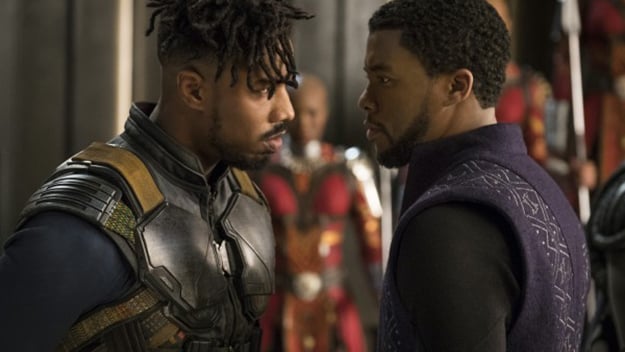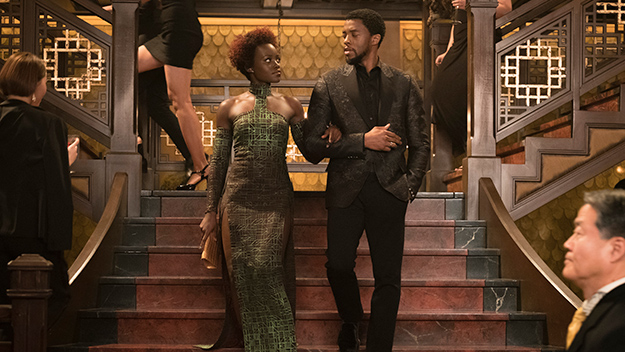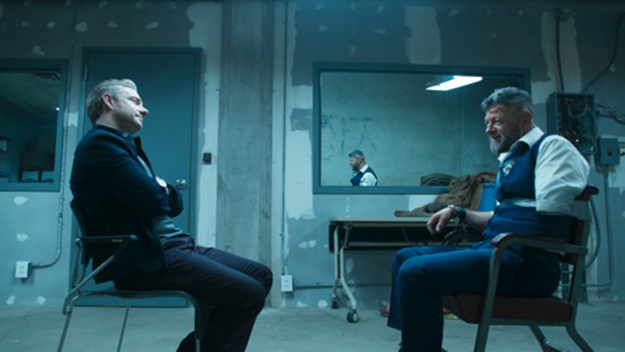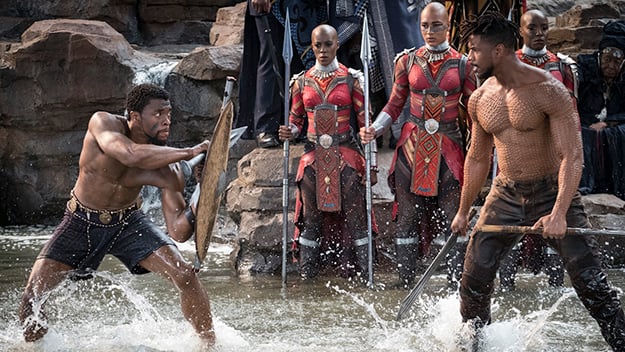Deep Focus: Black Panther

Ryan Coogler’s take on the mighty African hero is delightfully comic-book-y, in all the best ways. It summons the spirit of 1966, when Marvel Comics guru Stan Lee was still soaking up influences like a super-powered sponge, then carbonating them into fizzy pop elixirs. Coogler, like the Mighty Marvel Bullpen, has guts, flair, and vitality. What his movie lacks in shape and pith it makes up for in gusto and serious make-believe along with some delicious antic interludes. In the “silver age” of comic books, before the rise of self-conscious “graphic novels,” superhero comics functioned as deliriously inventive pulp revues—and that’s what Coogler gives us with this kinetic extravaganza. Black Panther delivers explicit messages about the good and bad of tribalism and the need for brotherhood and sisterhood, as well as implicit messages about African and African-American pride, with swashbuckling flair and eclectic, eye-popping spectacle.
The film deserves its lavish advance praise for expanding the diversity of the MCU (Marvel Cinematic Universe), but I’d like to offer a round of applause for its variety. One sequence resembles the unveiling of the dream city of Shangri-La in Frank Capra’s Lost Horizon, another recalls the casino action in half a dozen Bond films, while still others rescue the exotic excitement of jungle-adventure fantasies from the colonial condescension of Great White Hunter movies.
What makes it all feel new are the galvanizing figures of Black Panther (Chadwick Boseman), aka T’Challa, King of Wakanda, and the power-mad seeker of his crown, Erik Killmonger (Michael B. Jordan). Coogler emphasizes their humanity. He depicts Killmonger as a brilliant black-ops assassin before revealing the primal tragedy that spurs him on to political and then racial revenge. His ideological certitude is as intimidating as the pattern of scars he raises on his body to mark each kill. Black Panther/T’Challa, by contrast, is a charismatic liberal with a romantic streak, and a man who always weighs his options. When he meets his late father T’Chaka (John Kani) on the mystical Ancestral Plane, T’Chaka tells him, “You are a good man, with a good heart. And it’s hard for a good man to be king.” Between these two polar opposites, the movie develops its own odd, oscillating energy. It alternates between Shakespeare’s “uneasy lies the head that wears the crown” and Mel Brooks’s “It’s good to be the king.”

Because T’Challa is a good guy, he needs to surround himself with genuine allies. Most turn out to be women. Nakia (Lupita Nyong’o), a top “war dog” or spy, persuades him to sympathize more with needy people throughout the planet. Okoye (Danai Gurira), the chief of his elite female fighting force, struggles to hone his reflexes and keep him focused on each task at hand. His sister Shuri (Letitia Wright), this film’s version of 007’s “Q,” teases him mercilessly as she keeps upgrading his gadgets, his weapons, and even his shoes, while his mother Ramonda (Angela Bassett) anchors him to the dignity of the past. Nyong’o puts on a seductive display of sophistication while Gurira’s martial intensity burns a hole in the screen and Bassett emits regality from every pore. But Wright is the scene-stealer here. With killer comic instincts, Wright punctures any hint of pomposity with a flip remark or a flipped middle finger. This female ensemble energizes Boseman’s suave performance. He sparks to their passion and stands up to Jordan’s electric effrontery as Killmonger.
Black Panther gives off a contemporary crackle while staying true to its roots, both African and Marvel. The Black Panther character debuted in the July ’66 issue of Fantastic Four, which hit newsstands at roughly the same time Stokely Carmichael declared that his slogan was “Black Power!” Lee and his muscular artist-collaborator, Jack Kirby, feeling the vibes from the Black Is Beautiful and Black Power movements, envisioned him as a chiseled genius-shaman-warrior who is magnetically commanding both in and out of his big-cat suit. An extract from a heart-shaped herb connects him to Wakanda’s panther deity and endows him with super-speed and strength. His costume gives him retractable claws, like Wolverine’s. Wakandans have developed their technological wizardry from the metallic ore “vibranium,” which fell from space via meteorite millennia ago. As Sean Howe smartly notes in Marvel Comics: The Untold Story, Wakanda appeals to science faction readers who, back in the day, turned books about the intersection of revolutionary tech and antiquity, like Jacques Bergier’s The Morning of the Magicians (and Erich von Däniken’s notorious Chariots of the Gods), into international bestsellers. Wakandans have cut themselves off from the rest of the world to protect the vibranium and their way of life: that’s how their country eluded colonial pillaging, slavery, and warfare. So whenever danger knocks at its gates, this sci-fi Utopia goes into a state of siege. The movie asks whether any country can stay healthy protecting airtight borders.
Coogler made his feature debut with Fruitvale Station (2013), which followed police shooting victim Oscar Grant, a 22-year-old Oakland, California man, on his last day on earth. Here Coogler imbues the Black Panther mythology with a contemporary awareness that expands it playfully and purposefully. He frames the movie in the concrete jungle of an Oakland housing project, then hinges the plot on a life-or-death debate over whether a Wakandan owes allegiance solely to his own privileged people or also to the underprivileged throughout the world—including kids playing pickup basketball on a crumbling East Bay court. Coogler plants this conflict in the hearts and minds of T’Challa and T’Chaka, his true love Nakia, his spiritual counselor Zuri (the stalwart Forest Whitaker), and his boyhood friend W’Kabi (Get Out’s Daniel Kaluuya in a sly hangdog performance). Whenever the action turns didactic, Coogler’s visual imagination saves the day. It’s eerily funny to see a street kid stare up at the night sky and barely make out a futuristic Wakandan airplane—or at least its giant rotary blades, which look like they belong to a gargantuan electric razor.

What puts these characters in position for tragedy or triumph is Black Panther’s pursuit of Ulysses Klaue (Andy Serkis), the flamboyant South African black-market arms dealer. The only outsider to penetrate Wakanda and steal its precious metal, Klaue now sports a vibranium-powered super-prosthetic arm. He teams up with Killmonger to steal a Wakandan artifact from the Museum of Great Britain, leading to a shoot-out in a South Korean casino-speakeasy that involves both Black Panther’s team and Klaue’s opposite number, Everett Ross (Martin Freeman), a sympathetic CIA operative.
In sequences like that one, this movie doesn’t stint on the ooohs and aaahs, especially when Okoye demonstrates martial artistry with her vibranium spear or when Black Panther grabs hold of a car and tilts it in a high-speed chase or somersaults out of the way of a tumbling vehicle. The timing and staging convey their athletic wit and the individual scenes have neat visual punch-lines, like Nakia grinding to a halt in her driver’s seat, without the car, while Okoye uses her spear as a personal braking system.
But the movie really thrives on awe tinged with humor and empathy. Its most intoxicating setpiece comes early on, when Zuri officially installs T’Challa as Wakanda’s Black Panther/King. It begins as barges from far-flung tribes sail in golden vistas toward the waterfall of our psychedelic dreams. Clothed in colors so rich they seem edible, from lime green to tangerine, Wakanda’s leaders stand on ocher or umber platforms carved straight out of the cliff-side. They catch you up in their bobbing and chanting as they stare down at the arena where T’Challa vows to take on any challenger in a fair fight (Zuri stands ready with a tonic to strip him of his superpowers). Just when you’re sated with this wild riff on pomp and circumstance, the warriors of Wakanda’s mountain tribe, the Jabari, arrive thumping and vocalizing in their own scary sound and threatening tempo. Their chief M’Baku (Winston Duke) engages T’Challa in a fight to a “yield or die” finish.

Coogler fearlessly embraces the power of M’Baku and the Jabari tribe, whose deity is the gorilla. In other hands, their group portrait of simian power could smack of negative stereotypes. But with Coogler’s fresh vision they come off as nobly as the 300 Spartans. (It helps that Duke, from TV’s Person of Interest, proves to be an imposing presence and a jovial put-on artist.)
Both Black Panther and Creed (2015), Coogler’s unexpected knockout of a Rocky movie, revolve around a young hero struggling with his father’s legacy and his up-and-down relationship with an accomplished woman. Black Panther feels like a personal film, not just because of a budding auteur’s repeated exploration of some primal themes, but because Coogler suffuses the production with his own liberated consciousness. He doesn’t write off the beauty of the movie past, he revives it with images like two Wakandan horsemen racing on the ground against T’Challa’s sleek fighter in the sky. The movie’s Wakanda creation scene, done with swirls of vibranium ore, brought me back to John Huston’s sandy vision of God creating Adam in The Bible.
Coogler’s gift here is to combine timeless wonders with topical engagement. Cynics might sneer that Black Panther reaps the benefits of being a politically correct breakthrough: the first solo feature for a black Marvel superhero. But in the popular art of the movies, it’s a plus for a director to harness the breakout energy of his times. It gives the movie a pulse that ripples through the audience and keeps beating as the movie enters history. And Coogler never loses sight of the film’s comic-book roots. The result is a wonderful case of “Pop goes the Zeitgeist.”
Michael Sragow is a contributing editor to Film Comment and writes its Deep Focus column. He is a member of the National Society of Film Critics and the Los Angeles Film Critics Association, and a programmer at the Criterion Collection.







